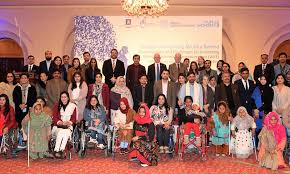‘Inclusion of women with disabilities imperative for women economic empowerment’

Islamabad: Improving economic situation of women is beneficial to society as it accelerates developments and contributes to reducing poverty, said Kjell-Gunnar Eriksen, Ambassador of Norway to Pakistan, at the dialogue on leaving no one behind – opportunities and challenges for promoting women’s economic empowerment (WEE) with focus on women with disabilities organized by UN Women Pakistan here on Tuesday.
“A long-standing champion of Gender Equality, the Government of Norway has been a key supporter of UN Women in Pakistan since the inception of its flagship programme on empowerment of women Home-Based Workers (HBWs). This partnership continues to grow and impact the lives of women and girls as we work to ensure no one is left behind.
Approximately 40,000 right holders – women HBWs and members from excluded groups, such as women with disabilities and transgender persons – residing in 23 districts of Pakistan have benefited from this partnership,” said the Ambassador.
Norway strongly supports UN Women’s three-fold mandate to deliver on women’s rights at normative, coordination and operational levels. “Together, we uphold and strive to ensure that women are economically empowered and afforded opportunities for leadership and participation,” he remarked.
The event was organized under the project ‘Moving from Charity model to Rights based work – Delivering as ONE for empowerment of Women with Disabilities’ supported by UN Partnership toPromote the Rights of Persons with Disabilities (UNPRPD). UN Women is working to advance the women with disabilities’ (WWDs) rights to employment and a life free of violence by increasing their recognition as rights holders, decreasing vulnerability, stigma and discrimination associated with disability, and enhancing capacity of Disable Persons Speaking at the occasion, Knut Ostby, Resident Coordinator a.i., United Nations in Pakistan, said, “The empowerment of women is a central factor in building strong economies and establishing more stable and just societies. According to recent statistics, the Pakistani economy could get a 30 percent boost in GDP by closing the gender gap.” Investing in the future of women will have wider benefits, such as increased productivity, rising national incomes and, most importantly, improved health and education outcomes for future generations, he added.
Federal Secretary Ministry of Human Rights, Rabia Javeri Agha, said that While Pakistan has many women in all spheres of life who have made us proud and marked Pakistan in the world, Pakistan still ranks at 151 on the Global Gender Gap Index. Pakistani women constitute only one fourth of the workforce while majority of them is engaged in the informal sector, working without legal protection.
“Empowerment is a complex and cross-cutting issue. No government can do it alone. We all need to take up joint initiatives for the social and economic empowerment of women in Pakistan,” she said.
“Ministry of Human Rights is working on empowering women with special emphasis on women with disabilities. We have introduced standardized questions in the new household survey – including BISP survey – to have better data on persons with disabilities in Pakistan. The ministry has also supported development capacities of the Police and other government institutions, on the rights and protection of transgender persons,” Agha stated.
Earlier, Deputy Country Representative UN Women Pakistan, Aisha Mukhtar, in her opening remarks said, “Women remain less likely to participate in labour market and are over-represented in informal sector. This lack of participation in formal sector affects women as they cannot break out of poverty, face discrimination and exploitation, and this also affects economy because when more women work, economy grows.”
“The next 10 years – the UN Decade of Action for the attainment of SDGs – must be about fixing the gender gaps. When we commit to leave no one behind, we are talking about not forgetting women who are disabled, women who live with violence, and women who are employed in informal sector which is highly vulnerable. In order to boost women’s economic empowerment in Pakistan, we are supporting legal protection, financial inclusion, skill development and an inclusive business culture by encouraging companies to sign up to Women’s Empowerment Principles and promote gender responsive procurement,” said Aisha.
Three women, a blind woman Ms. Naseem Akhtar from Islamabad, a polio affected Ms. Shahina from Karachi, and a home-based worker Ms. Sadaf from Karachi also shared their stories of struggle and success with the audience.
Later a panel discussion on the Role of Private Sector Companies in promoting Women’s Economic Empowerment was arranged with Abdullah Abdur Rehman Khan, Manager Sustainability, Telenor Pakistan; Fatima Arshad Assistant Manager, Corporate Communications, Unilever Pakistan; Fatima Akhtar, Manager Public Affairs Nestlé Pakistan; and Claudia Manuel, Head of Communications Procter & Gamble Pakistan, as panelists. The discussion was moderated by Bilal Shaikh, Head of Internal Business Development Eighteen.





